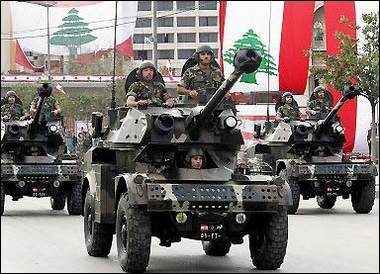 DUBAI, 23 January (IRIN) – Political observers often cite Lebanon as an example of freedom and democracy amidst other non-democratic states in the region. They point to the country’s relatively free press, and the fact that no major political parties have been banned. Consequently, Lebanon’s political landscape has not been dominated by one family or party, but by a variety of faces and parties.
DUBAI, 23 January (IRIN) – Political observers often cite Lebanon as an example of freedom and democracy amidst other non-democratic states in the region. They point to the country’s relatively free press, and the fact that no major political parties have been banned. Consequently, Lebanon’s political landscape has not been dominated by one family or party, but by a variety of faces and parties.
There is also an unwritten agreement that Lebanon’s president has to be a Maronite Christian, the Prime Minister a Sunni Muslim, and the Speaker of Parliament a Shi’ite Muslim. The 1989 Taif Agreement which officially ended Lebanon’s 15-year-old civil war, modified the covenant by giving more seats to Lebanon’s Shi’ites, and dividing parliamentary seats equally among Christians and Muslims. According to Safa, confessionalism "is in fact the main obstacle to create a representative, merit-based parliamentary democracy". "There are no political parties or programmes in Lebanon," he explained. "People vote for their sectarian leaders, who are often medieval, feudal overlords in four-wheel drives, who abuse the system to consolidate their power." The system has been corrupted primarily by the constant changing of the national election laws determining the size and make-up of electoral districts, Safa said. The 1989 accord stipulates that parliamentary elections are held on the basis of "muhafazats," or the six large administrative districts into which Lebanon is divided: North Lebanon, Beirut, Mount Lebanon, Beqaa valley, Nabatiyeh and South Lebanon. During the first post-war elections in 1992, however, a new electoral law decided that in the Mount Lebanon district, elections would take place in six smaller districts, while the Bekaa Valley was cut into three smaller districts. During the 2000 elections, the muhafazat were divided into 14 electoral districts where, for example, the anti-Syrian Christian region of Bsharre, became part of the predominantly Sunni electoral district. Mount Lebanon was divided into four and Beirut into three smaller districts. "Pre-election negotiations to change electoral districts have always been part of the Lebanese consensual system," said Safa. "After the Civil War ended, however, it was done under complete Syrian tutelage with the sole aim to on the one hand, curtail and prevent political powers critical of Syria, and on the other hand, to push pro-Syrian candidates into power." The changing of electoral districts is not the only problem facing Lebanon’s democracy. According to the Lebanese Association for Democratic Elections (LADE), formed in 1996 to monitor elections and educate voters, the 2000 elections were characterised by many irregularities such as "the illegal use of government vehicles to transport voters to polls" and "vote buying". "Following the killing of [former Prime Minister Rafik] Hariri in February 2005," Safa continued, "Lebanon had a golden opportunity for change, but unfortunately local leaders again exploited the system to strengthen their positions". A roller-coaster of events followed the death of Hariri, starting with the withdrawal of Syrian troops in April 2005. Experts say Syria had ruled Lebanon de facto, after it entered the country in 1976 to intervene in Lebanese fighting. A continuing UN probe has found the assassination of Hariri "could not have been taken without the approval of top-ranked Syrian security officials". Before part of the report was released in October 2005, there were mass protests in Lebanon calling for a Syrian pull-out. The 2005 elections were the first legislative elections in 30 years to take place in the absence of a Syrian military presence, a fact that gave them remarkable vitality, according to a report published by the United Nations Development Programme on Governance in the Arab Region (POGAR). The total number of registered Lebanese voters amounted to 2.8 million, of whom 1.2 million voted. The rate of participation was 42.9 percent, ranging from 36 percent in Beirut to 55.5 percent in Mount Lebanon, the POGAR report said. "The elections were characterised by unprecedented alliances and coalitions across the political board that left a very small chance for independent candidates to win," the report also stated. During the elections in the district of Aley, for example, Druze followers of Walid Jumblatt, teamed up with the Shi’ite "Party of God" Hezbollah, and the Christian right-wing party "The Lebanese Forces" to counter the list headed by former Prime Minister, General Michel Aoun. Though "List Jumblatt" only had a few hundred votes more than the "List Aoun," the former took all of the seats. "One of the first things we want to introduce to improve the calibre of Lebanon’s democracy," said LCPS’s Oussama Safa, "is to replace the winner-takes-all principle by that of proportionality, which means the candidates with most votes take the seats, regardless of the list they’re on". Other measures the LCPS is pushing for include a quota system to secure a minimum of 30 percent of women representatives, and an independent committee to organize and oversee elections. "We know we cannot take the confessional system head-on, as it is too deeply rooted in our society," Safa said, "but we can introduce new measures step by step, which in the long run make it redundant". According to Safa, however, it is not enough to create a better system if even basic democratic values are not respected. "A healthy democracy is essentially based on dialogue," he said. "The Lebanese, however, do not have dialogue. They debate from ever-polarized positions, which is a very dangerous development." "Take Hezbollah and the Lebanese Forces," he said. "They are unable to listen to and respect each other’s differences."



